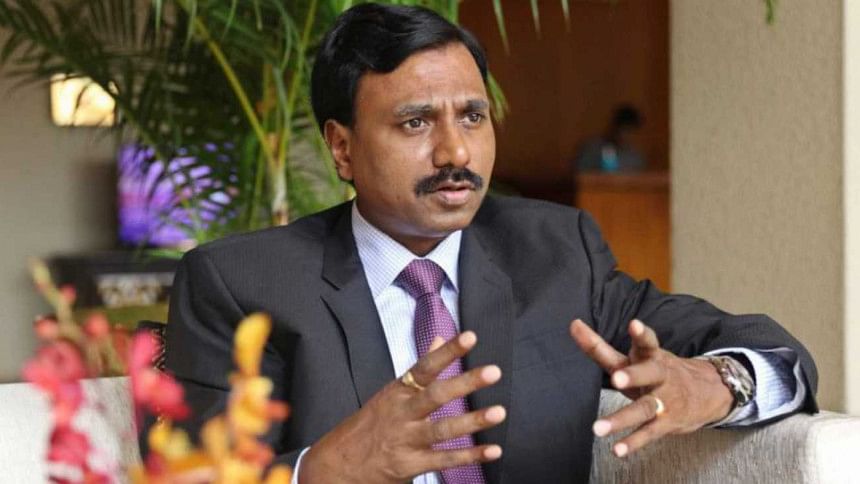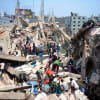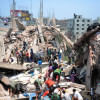Workers' rights issues remain a challenge

In these four years how would you evaluate the progress Bangladesh has made in terms of implementation of the National Tripartite Plan of Action?
In the four years since the Rana Plaza tragedy, considerable progress has been made towards improving workplace safety in Bangladesh's garment sector. However, there is still much to be done.
The revision of the Bangladesh Labour Act in 2013 and the issue of its implementation rules in 2015 have both contributed to a better safety environment by introducing the need for factories to establish safety committees.
The inspection of virtually all export-oriented RMG factories for structural, fire and electrical safety is a major achievement. Those posing an immediate danger were closed while all others are undergoing remediation. The remediation process needs to be completed, and the formation of a Remediation Coordination Cell (RCC) to oversee remediation in factories under the national initiative will be an important step.
The Department of Inspections for Factories and Establishments has been transformed. It has greater budget, staffing, resources and capacity, and is now better able to carry out its regulatory mandate in a far more effective, accountable and credible manner.
Good progress has been made to build a culture of occupational safety and health at both the institutional and enterprise level. Awareness of issues such as fire safety is far better than it was four years ago. Proper certified fire doors are now commonplace in the industry while previously they were rare. Millions of workers, supervisors, managers and security guards have also been trained on basic safety, such as what to do if a fire breaks out.
The ILO/IFC Better Work Programme has also been launched in Bangladesh and is currently partnering with over 120 RMG factories, employing some 250,000 workers. By working closely with factories, Better Work is not only making a valuable contribution to factory compliance but also helping to boost productivity and competitiveness.
I should also mention the efforts underway to establish a national Employment Injury Insurance scheme, which would provide workers with compensation in event of any workplace accident or illness. This initiative grew out of the efforts to compensate Rana Plaza survivors and once operational will benefit workers and employers alike.
While much has been done, it is vital that efforts to build a safe RMG sector do not lose momentum so that changes which have taken place in the RMG sector also begin to be replicated in other industries for the benefit of all workers.
What are the biggest challenges relating to labour rights issues?
While there has been good progress made on workplace safety, workers' rights issues remain a challenge.
There remains a widespread distrust in Bangladesh between employers and trade unions. Such negative attitudes pose barriers to the formation of new unions and for existing labour unions to operate effectively.
The amendment of the Bangladesh Labour Act in 2013 did make it slightly easier to form unions. This led to good growth in RMG trade unions during 2013 and 2014; however, new registrations have since slowed considerably and it is important that issues relating to the trade union registration process are addressed.
In June 2016, the ILO Committee on the Application of Standards concluded a special paragraph calling for further amendments to the Bangladesh Labour Act relating to freedom of association and collective bargaining to bring it in compliance with international labour standards, including revisiting the minimum 30 percent requirement of membership for union registration.
Trade unions need to be allowed to operate without harassment or obstacle. Genuine efforts are needed to combat anti-union discrimination and unfair labour practices. At the same time, the trade union registration process needs to become a smooth and expeditious formality in accordance with objective and transparent criteria.
In addition, changes need to be made to the legal framework applicable in the Export Processing Zones to ensure that the rights of workers are commensurate with those provided in the national Labour Law and international labour standards.
These conclusions of the Committee on the Application of Standards are important and need to be acted upon. The progress of the government in addressing these issues will be considered during ILO's International Labour Conference in June 2017.
How equipped is Bangladesh to deal with compliance issues after the pressure, in the forms of Accord and Alliance, ceases to exist?
Over the past four years ILO with the support of Canada, the Netherlands and the United Kingdom has provided considerable support to the Government of Bangladesh to strengthen its regulatory mechanisms and capacity in preparation for the day as and when support from the Accord, Alliance and development partners ends. Considerable progress has been made in this regard. There are now more harmonised standards, protocols and processes in place relating to building safety. Regulators are working together and their staff are better trained.
The establishment of the Remediation Coordination Cell (RCC) to oversee remediation of the 1,500 factories under the national initiative is another key step. This is a concrete manifestation of efforts to institutionalise safety reforms which will ultimately benefit all sectors. It will further contribute to the national capacity of regulators as well as collaboration between them. In addition, the RCC will help further facilitate knowledge transfer from the Accord and Alliance, both of which have provided excellent support to the national initiative over the past four years.
In terms of policy and law, what should Bangladesh focus on in the medium- and long-term?
As already mentioned, there needs to be further amendments to the Bangladesh Labour Act as well as the draft EPZ law to bring them into compliance with international labour standards. Other areas include the development of a credible industrial safety agency, preferably a one stop shop, for granting building plan approvals and all other licenses and monitoring compliance in respect to structural integrity and fire safety of all industrial buildings. ILO is supporting the government to develop such a single window mechanism. This will help ensure factory safety and give confidence to buyers and brands to continue to invest in Bangladesh, as continued industrial growth and creation of new jobs is critical for poverty alleviation and growth. For these reasons, ILO strongly encourages the government, employers and worker organisations to work towards making the industries safe and providing conditions for the realisation of labour rights, which is necessary for inclusive growth and development.
One of the major complaints from the workers has been in terms of the low minimum wage. What are your thoughts on that? How does it compare to the ILO's standards for minimum wage structure?
In a country where collective bargaining is still quite weak and industrial relations are not very developed, the minimum wage is very important. The minimum wage has increased since the Rana Plaza collapse, but clearly there is room for ongoing discussion about whether it is sufficient. The right way to do this is for the government to consult with workers and employers to fix what they consider to be the right wage.

 For all latest news, follow The Daily Star's Google News channel.
For all latest news, follow The Daily Star's Google News channel. 







Comments